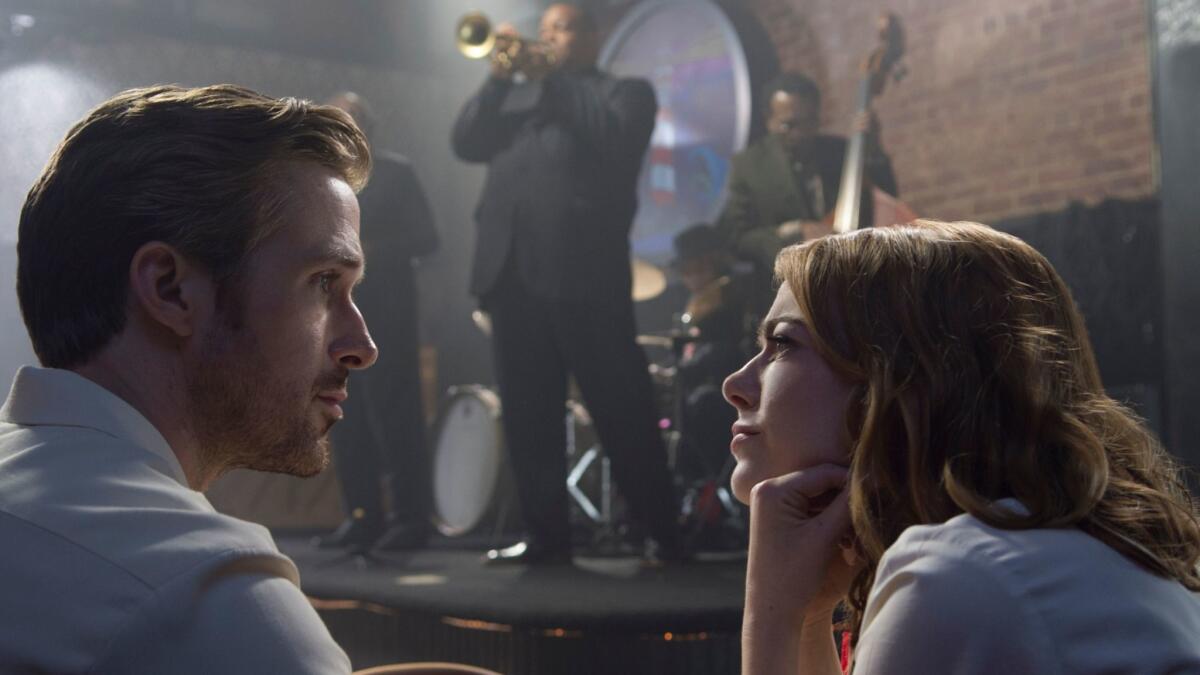Overrated/Underrated: Oscars 2017 have never mattered less yet continue to stand for more

- Share via
If the annual Oscar campaigns are convinced of nothing else — other than the greatness of whatever film they represent — it’s their own importance. The message of this elongated award season is: “See this movie or be left adrift in the cultural conversation motion pictures gratefully provide.”
Except for years, that conversation has been well in progress by the time Hollywood has tried to offer its reflection in the gilded hall of mirrors that is the Academy Awards.
The last two years’ ceremonies underscored a shameful myopia that inspired #OscarsSoWhite, and this year — with the nominations of “Moonlight” and “Hidden Figures” as well as Denzel Washington, Mahershala Ali, Dev Patel and Naomie Harris — that criticism has at least been partly addressed. There are moving films and performances among this year’s nominees that by and large deserve whatever additional light a gold award can shine on them.
And yet, at a time when dipping into social media for a few minutes offers a very real impression of our democracy, if not the entire world, in peril, the Oscars have never felt as if they mattered less.
With the technicolor, backward-looking fantasy “La La Land” a prohibitive favorite practically from the moment it first screened, 2017’s Oscar winner stands to be as tied to current events as its musical sibling “Oliver!” was in 1968. But with the pop culture becoming indistinguishable from politics in the wake of a divisive election, audiences are now assigning a greater significance to the nominated contenders — even if Hollywood won’t.
With its salute to show business dreamers and swooning love for classic cinema, the colorfully apolitical “La La Land” has been presented as the opposite number to the equally celebrated “Moonlight.” A three-act vision of growing up black and gay on the unforgiving streets of Miami, the film explored an outsider’s struggle with a rare sensitivity and originality of vision. Suddenly, as the conversation around the Golden Globes proved, a loss for “Moonlight” constitutes something like another step backward for an inclusive society.
In a way, the heightened stakes is a dream scenario for the Oscars, which has struggled with viewership and even tweaked the best picture category in 2011 to allow for more contenders and, ostensibly, the interest of their fans. Though the crass, fake-innovative “Deadpool” was floated as a possibility, the resulting best picture field includes the usual field of heartsick prestige dramas (“Manchester by the Sea”) and reexaminations of World War II (“Hacksaw Ridge”) along with a few films more aligned with current events.
The crowd-pleasing and necessary “Hidden Figures” told the story of the racism faced by some of the key minds of the space program, and “Hell or High Water” offered a grim, gun-wielding depiction of rural Texas that satisfied both red and blue state bubbles. Then there’s the unexpectedly timely plea for global unity in the high-minded sci-fi of “Arrival.”
With each day bringing a new political firestorm, just about every event in mass media once considered escapist entertainment — the Golden Globes, the Grammys, the Super Bowl — can be boiled down into an opportunity to redress election night.
Early this month, those weren’t only the New England Patriots defying long odds against Atlanta, that was Donald Trump’s election expressed through football (as he helpfully pointed out on Twitter, reflecting an apparent friendship with the team’s owner, coach and quarterback). That wasn’t just Adele sweeping the Grammys, that was a controversy-free white artist overshadowing the socially conscious, proudly black artistic vision of Beyoncé. That night, as “Hello” took home song of the year, there was an unsettling sense among those pulling for “Lemonade” that Adele had somehow won Florida.
And yet, for all the heightened stakes that have come with the whirlwind of current events, little will have changed on Monday regardless of who wins. The rural economic apocalypse that spurred the bank-robbing siblings of “Hell or High Water” will be no closer to resolution should that film be named the unlikely best picture winner, and the threat to gay rights that could be posed by the new administration will be unmoved by a victory for “Moonlight.”
Similarly, the inevitable coronation for “La La Land” will not negate the personal impact of any of the above films had on their fans, any more than Seb’s nightclub will emerge from some man-splaining keyboardist’s imagination to save jazz (which is truthfully doing just fine without it, thanks). A pointed acceptance speech can inspire a fellow showbiz dreamer or an inevitable dismissive tweet, but its reach only goes so far.
Validation from some governing body will feel tremendous, as everyone in the theater on Sunday knows. But the longer, more crucial conversation goes on outside the door, whether there’s a camera in front of it or not.
See the most-read stories in Entertainment this hour »
Follow me over here @chrisbarton.
ALSO:
Overrated/Underrated 2016: After a year of hot takes and backlashes, what are we doing here?
How we overlook the flaws in the ‘The Night Of,’ ‘Stranger Things’ and more
Comic Sebastian Maniscalco recounts his road from the Four Seasons to the Comedy Store (and beyond)
Judd Apatow and Pete Holmes get real about comedy in HBO series ‘Crashing’
The complete guide to home viewing
Get Screen Gab for everything about the TV shows and streaming movies everyone’s talking about.
You may occasionally receive promotional content from the Los Angeles Times.




